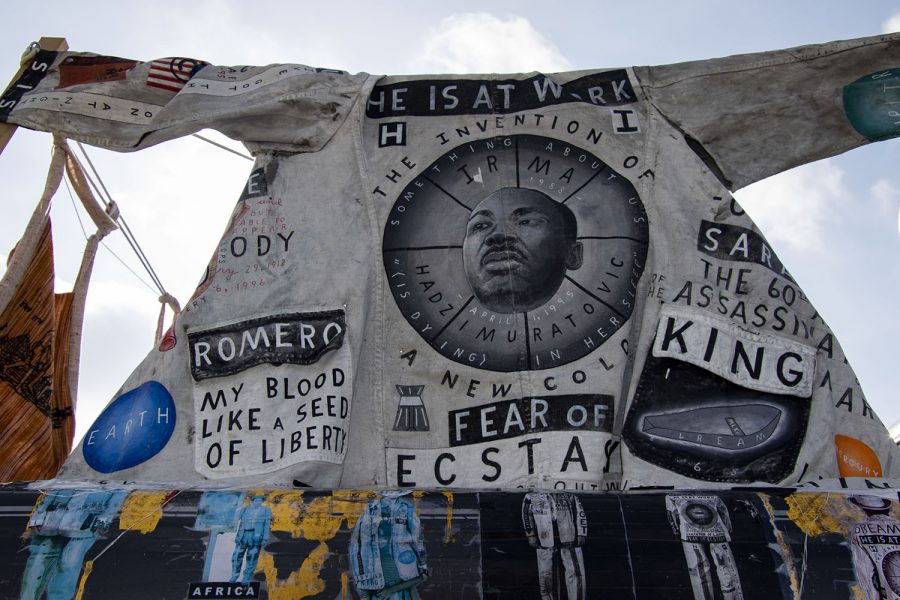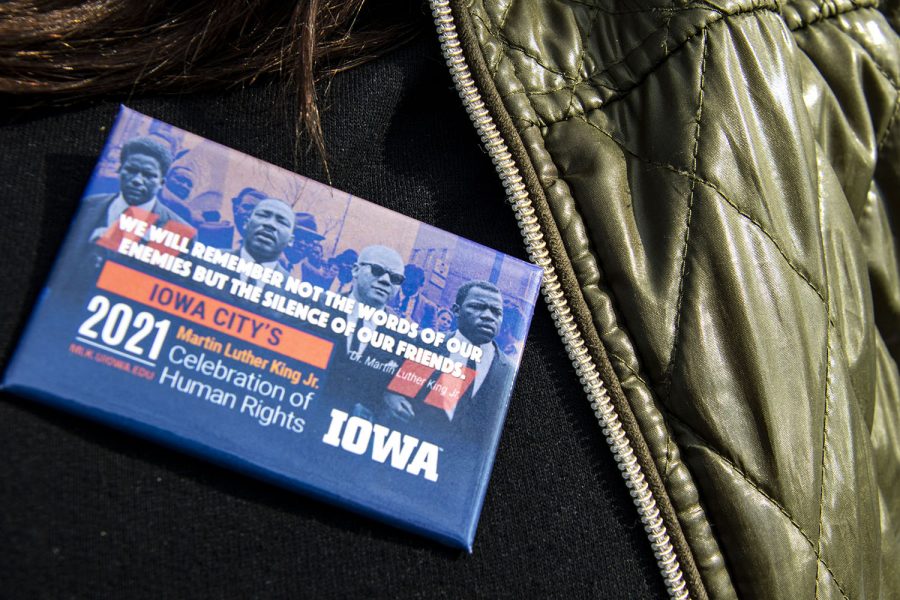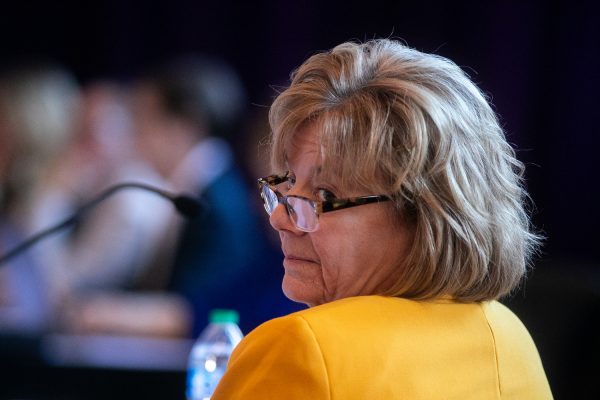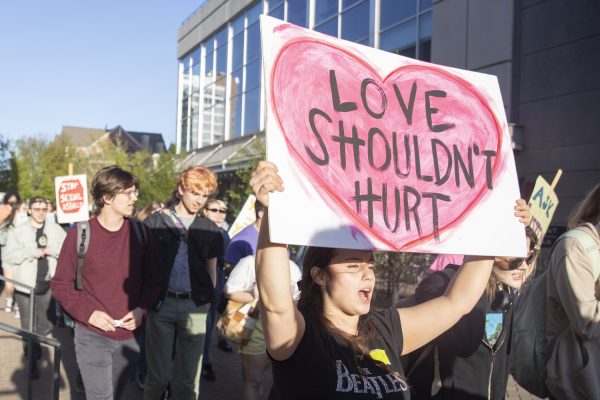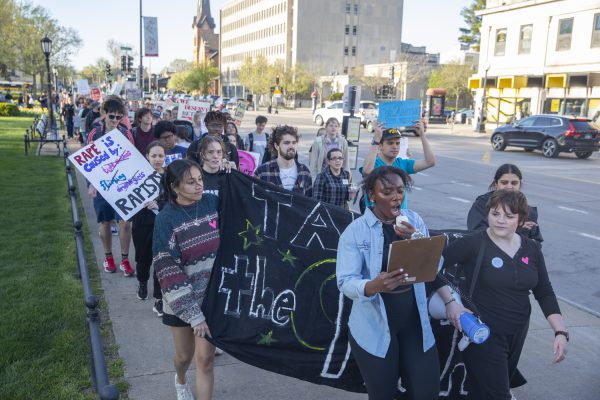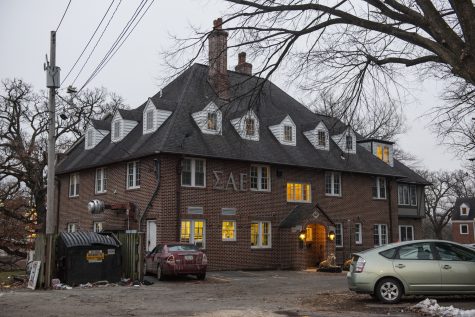Iowa City Martin Luther King Jr. Celebration virtually celebrates human rights advocates
More than two dozen people organized a two-week mostly virtual celebration series of events to recognize everyday Black excellence, service, allyship, and civil rights leaders.
A vehicle display in honor of Dr. Martin Luther King Jr. on Monday, Jan 18, 2021.
January 18, 2021
The University of Iowa and Iowa City kicked off their Martin Luther King Jr. Celebration — a full two weeks of festivities, online programming, and service projects this year — on Monday, to celebrate a towering figure in human rights.
Afro House Coordinator at the University of Iowa Shalisa Gladney said while the team adapted the normal in-person day of service online, the message behind the celebration rings true every day — not just the third Monday in January.
“We will remember not the words of our enemies, but the silence of our friends,” Martin Luther King Jr. said in a 1967 broadcasted lecture, the lead quote on celebration’s event page.
This sentiment is one Gladney said she hopes resonates with people long after the two-week celebration is over.
“We’re thinking about different forms of injustice and bias, and how important it is for folks who are allies, or folks who have more power than another individual to really step up for those who cannot,” Gladney said. “And we’ve also been talking a lot about community and wanting to create the community that we all want to live in.”
The two-week celebration includes virtual events and service projects, including a Stanley Museum studio tour with artist Simone Leigh, blood drives on Thursday, a two-session Saturday youth summit with interactive workshops, games, conversations, and skill building oriented toward social justice, equity, and community building, at-home service projects, and an interactive online program from UI junior Samer Suleman called “Honoring Unsung Heroes.”
Monday’s celebration kicked off with introductions from prominent Iowa City leaders — Iowa City Mayor Bruce Teague, Johnson County Supervisors Vice Chair Royceann Porter and Chair Pat Heiden, a prayer from Kim Bryant Bethel at A.M.E. Church, a land acknowledgement from LNACC Coordinator Isa Flores, and a series of musical, spoken word, and dance artists.
Teague encouraged people watching the live stream to show support with everyday service — shopping at Black-owned businesses, voting, and engaging with public service activities.
“The last several months have seen unspeakable atrocities that have outraged, but sadly not surprised us,” Teague said, the first Black mayor of Iowa City. “There has been justifiable outrage. Demonstrations and protests have occurred and it has renewed the struggle for justice. I have been a participant in these demonstrations. I’m sure many of you have as well. Expressing how we feel about what has occurred both lately and historically, and demand and change is vitally important.”
Over Teague’s tenure, in May, George Floyd was killed in Minneapolis, sparking protests against racial injustice nationwide and in Iowa City.
“We build a better society one small action at a time,” Teague said. “And there are so many ways to get involved and create systemic changes within our community. Martin Luther King Jr. didn’t shy from challenges. He was very direct and pointed out the injustices of our society. But his tone was always one of hope. There is hope, because we can all make positive change.”
King became the most prominent spokesperson for the civil rights movement in the 1950s and 60s, marching for voting and labor rights, desegregation, and other civil rights. He led the 1955 Montgomery Bus Boycott and protests in Birmingham, Alabama in 1963. Later in 1963, he aided in organizing the March on Washington, where he gave his iconic “I have a Dream” speech.
One event Gladney said she is looking forward to is a virtual screening of Good Trouble, a movie about civil rights activist, John Lewis, who led the first of three marches from Selma to Montgomery, and later in life served as congressman from Georgia. Lewis died in 2020.
She added that virtual service projects this week are a key way for people to get involved. Sans pandemic, the UI normally organizes groups in person to complete service projects for the celebration. This year, organizers set up drop-off locations and pick-up spots for people to assemble kits from afar.
Projects include an at-home assembled literacy kit with a children’s book and activity, an emergency care kit with essentials such as toothpaste, shampoo, deodorant, and soap, for a person escaping domestic or sexual violence to be donated to Domestic Violence Intervention Program and Rape Victim Advocacy Program.
From Jan. 25-Jan. 30, item donations will be accepted for local food pantries at various locations.
The UI has recognized Martin Luther King Jr.’s birthday, Jan. 15, since 1969. In 1990, the UI started the Human Rights convocation program, in which afternoon classes were canceled for programming surrounding discussions about diversity, equity, inclusion, and human rights.
The UI designated the third Monday in January an official university holiday in 1995.
Suleman, the UI junior and programming assistant for the University of Iowa Afro-American Cultural Center, tapped into his experience at Iowa’s annual African American festival in Des Moines, I’ll Make Me a World, where he competed in a Black History Game Show, to put together the informational program. “Celebrate Black Excellence Everyday: Honoring Unsung Heroes.”, a presentation with regular pauses for comments, discussions, and polls will go live Jan. 26 at 7 p.m.
He’ll talk about living civil rights figures, Black folks who do everyday acts of service, and those whose contributions aren’t as highly recognized. He said he’ll talk about former Georgia gubernatorial candidate Stacey Abrams, who set up robust voter mobilization ahead of the 2020 election. He’ll also discuss Capitol Police Officer Eugene Goodman, who led insurrectionists away from the doors of the U.S. Senate chamber moments before they were sealed in the Jan. 6 breach of the capitol.
He said he hopes people will learn more about lesser-known Black figures in history and today, and even research from time to time on their own about Black history and current events.
“By recognizing people that are still around today, the message you’re trying to send is that we shouldn’t only focus celebration around the big names that you’ve heard growing up or take attention in the media,” Suleman said. “There’s always more people out there that aren’t as recognized that are still worth researching and getting familiar with.”
After the two weeks, Gladney said, it’s important to continue momentum throughout the year to continue everyday acts of building a community and deconstructing injustice. That can be as simple as shoveling a neighbor’s walkway in the winter when you have the time or speaking up in a meeting when something is said that doesn’t reflect workplace values or culture.
“We’re thinking about our neighbors and beloved community for the next two weeks, and then we don’t want to forget about them in February and March,” Gladney said. “So, it’s really important that we keep like whatever energy we have going into this.”
For more information on events and service projects available during the University of Iowa’s Martin Luther King Jr. Celebration, click here.



